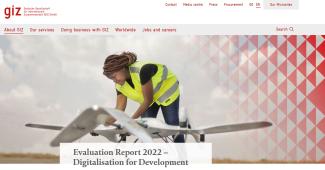GIZ
Relations with stakeholders drive GIZ success
 https://www.giz.de/en/aboutgiz/115062.html
https://www.giz.de/en/aboutgiz/115062.html
On a scale from 1 (highly successful) to 6 (highly unsuccessful), the overall grade for GIZ was 2.3 last year. That was a bit below the previous evaluation report for 2021, but above the level of 2020. The grade results from the assessment of some 200 projects.
The new report’s core topic is digitalisation. According to Ingrid-Gabriela Hoven, a member of the executive board, three things matter in particular to GIZ:
- standards for and regulation of the digital sphere, including in regard to ethical questions concerning, for example, artificial intelligence,
- tangible IT solutions for the partners of GIZ and
- digitised platforms for learning.
Digitised approaches make GIZ efforts more effective, Hoven says, but emphasises that they must fit local contexts. Whether a specific agricultural project can benefit from technology, for instance, depends on the local infrastructure.
The report states that digital elements figure in more than 500 different GIZ projects. In Ghana, for example, citizens can use an app to give feedback regarding public services. In Mongolia, a platform was set up to digitise penal-law proceedings in court in a way that reduces mistakes and, at the same time, the workload of clerks. In Malawi, digitised registration of patients has helped health centres provide better services, according to GIZ.
Projects in Africa – and particularly sub-Saharan Africa – delivered poorer results than in other world regions. Hoven says that the reasons include difficult contexts, which are marked by refugee movements, for example. Moreover, GIZ tends to have stronger networks with partner organisations in other continents, for instance Latin America, Hoven points out.
In contexts of fragile statehood, Hoven acknowledges that GIZ should pay even more attention to whether local scenarios are properly understood. She also sees room for improvement in terms of ensuring that established projects remain viable long term. The longer GIZ operates in any specific place, the more successful its projects are likely to turn out there, Hoven says. Generally speaking, strong results tend to be the fruit of:
- close cooperation with stakeholders,
- the competence of project teams and
- the individual performance of team members.
In regard to digitalisation, GIZ can stimulate developments, but not bring about comprehensive change, Hoven argues. For that to happen, a country’s legislative and cultural context must change, so national policymakers must play their role.
In the eyes of Jochen Flasbarth, who is chairman of GIZ and state secretary at Germany’s Federal Ministry for Economic Cooperation and Development (BMZ), the agency has recently been facing tougher international conditions due to global shocks. Low-income countries, he says, struggle to cope with the impacts of the Ukraine war, for example.
The GIZ must be able to show that it is managing public funds well, Flasbarth insists, and professionally competent evaluation serves that purpose. It is done at several levels. The GIZ’s evaluation department assesses projects, but projects also do self-assessment. Moreover, Germany’s Foreign Office evaluates some GIZ work and so do independent institutions such as DEval, which focuses on international development, or ZUG, which specialises in environmental sustainability.
The GIZ is headquartered in Bonn and Eschborn. It is a service provider in the field of international cooperation for sustainable development. It gets most of its assignments from the BMZ. In 2021, its turnover was 3.7 billion euros. About 25,000 people in some 120 countries work for the GIZ.
Link
GIZ, 2023: Evaluation Report 2022: digitalisation for development.
https://www.giz.de/en/downloads/giz2023-en-evaluation-report-2022.pdf
Jörg Döbereiner belongs to D+C/E+Z’s editorial team.
euz.editor@dandc.eu

